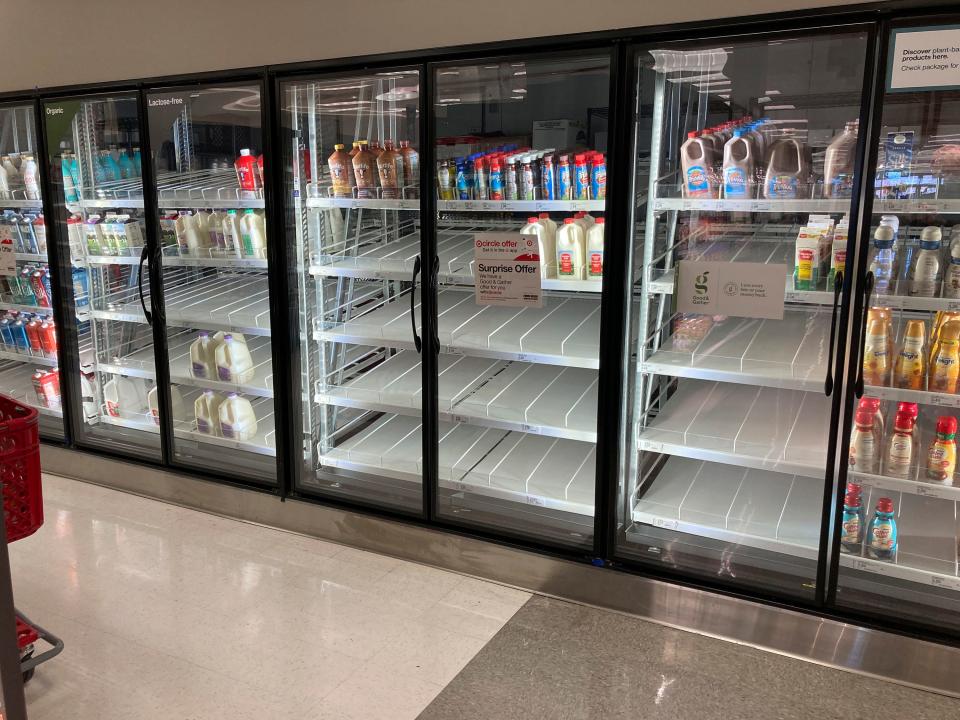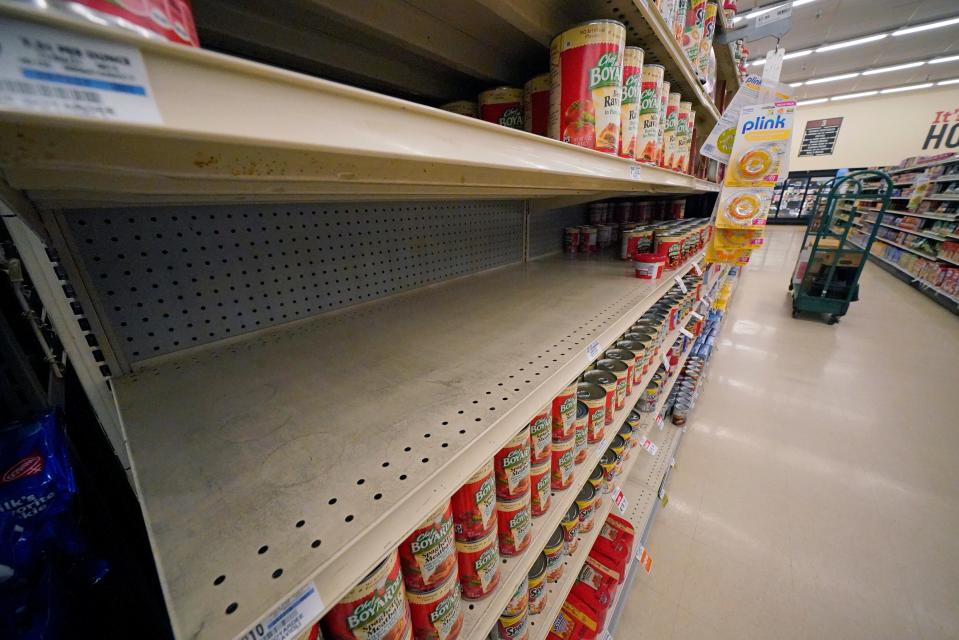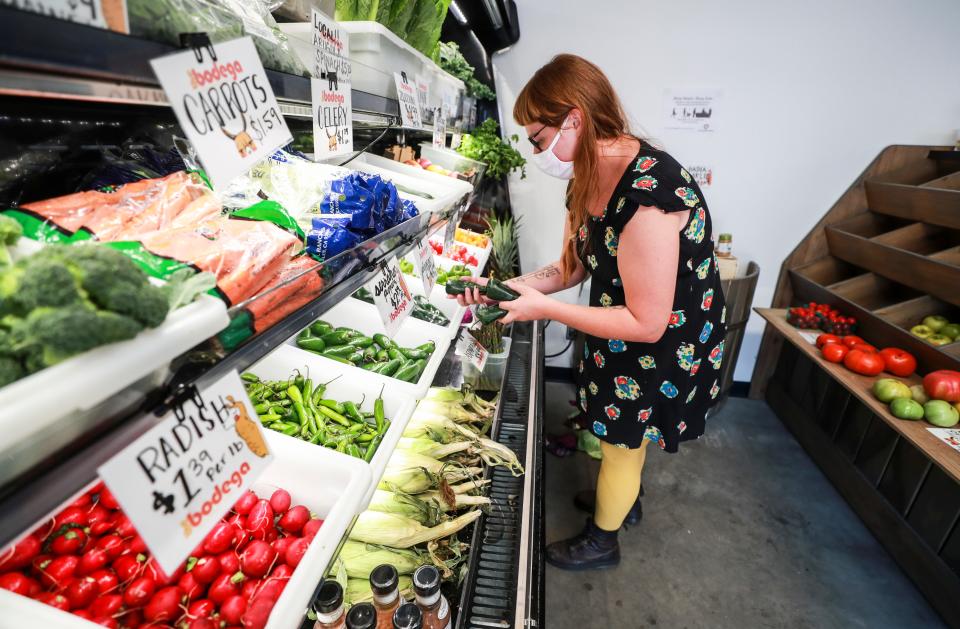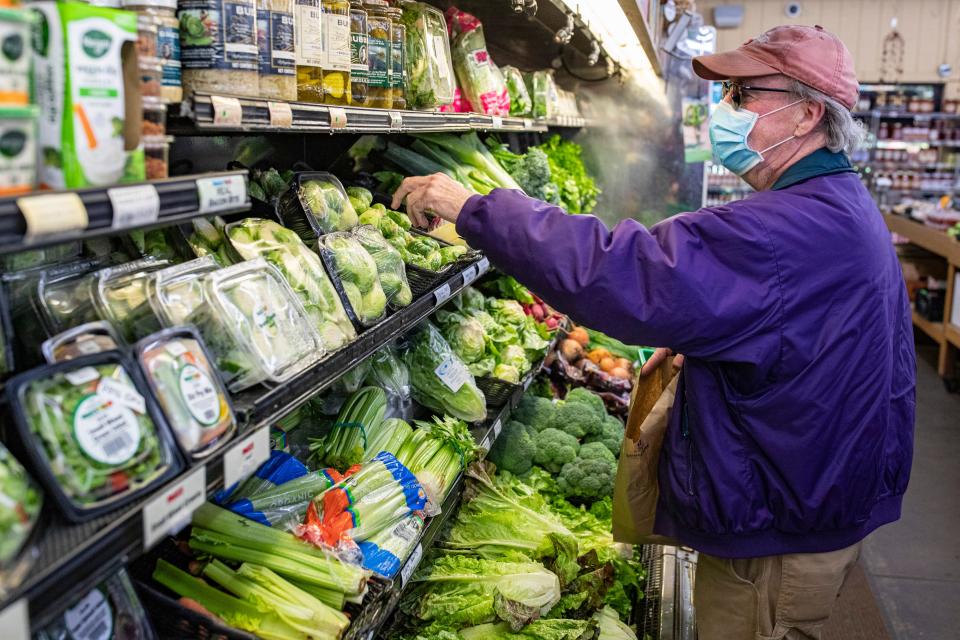Empty shelves again? Here are 5 tips to help anyone deal with grocery store food shortages

Does it ever feel like we’re living in some kind of weird time loop conveyor belt? Like, we thought we already lived through the grocery shortage period of the coronavirus pandemic, but here we are again, standing at the grocery store, this time in our N95 masks, staring at the bare shelves, wondering what we’re going to cook when half the things on our list are out of stock.
Imagine being a restaurateur.
It’s not just a matter of trying to swap ingredients; they’re trying — still — to keep the business afloat, and customers happy. Yet somehow, they are still hospitable and generous enough to share their learnings in ways that can help us when we’re cooking at home.
I talked with chef Alison Settle of Barn 8 at Hermitage Farm, who shared some hard-won wisdom and counsel as she walked me through CliffsNotes version of the last two years for the restaurant and hospitality industry and her tips for shopping empty shelves. A missing pasta extruder was the first sign of what was to come, she recalled.
Barn 8 was just about to open when COVID-19 was surging in Italy. The machine they’d ordered “was literally stuck on a container ship in the harbor in Italy for months because the people on the boat couldn't leave, they weren't allowed to come here.”
“The supply chain issue is ongoing and has been for a while,” she told The Courier Journal. And looking back, “not only were all these ships stuck in harbors,” but restaurants everywhere were going through iterations of curbside, with everyone needing gloves, and masks, and to-go containers, and of course prices went up if you even could get these items. Gloves for instance have gone from $40-50 a case, she says, to $150.
You may like: Bourbon for beginners: 5 tips to help anyone become a bourbon aficionado

Food supplies have been drastically impacted as well. One of their primary purveyors has eliminated Sunday deliveries and “second runs” that allowed same-day orders, and pushed back the ordering cut-off time, making an already precarious situation even more difficult. Not that it’s their fault; the domino effect of people getting sick and not going to work effects, well, everything.
And it's not just a restaurant issue. Think about a staple in most American households: chicken.
“The supply chain is broken down,” Settle says. “They can't get corn from the farmers to feed the chickens. They can't get staff to run the farms. They can't find an appointment to get the chickens slaughtered. There are not enough people to drive the trucks. There aren’t enough people to repair the refrigerators. It's all the way down and we get to a point where you're like, 'Hey, I know this guy who lives 30 minutes away. He's got a farm. His name's Luke Groce. He raises (the chickens) on rotating pastures (and they’re) slaughtered by the Amish.' Like, it's right there. You don't have to rely on this whole complicated system of millions of middlemen.”
Everything from basic staples (think sugar) to the same kinds of things you and I are seeing disappear from store shelves have become next to impossible to count on for restaurant owners. This means they have to plan further and further ahead and that's trickling down to regular shoppers, too.
So here are Settle's five tips and tricks to help anyone deal with grocery store food shortages.
Don’t wait until you're out of something to shop

As I learned the hard way making dinner for friends last week after their family’s bout with COVID-19, you can’t just run to the store an hour before dinner for green onions. There were none to be had.
Settle says we all need to adjust our "I'll just grab that when I run out" mentality.
“Don't go to the store to replace your sugar or your milk or your potatoes until you're completely out and your kids are screaming for hashbrowns,” Settle says. Get those staples and others like it as part of a regular grocery run.
And plan ahead for meals, too. You want to “give everything two or three days more than you normally would because you might go to the store today and they're not gonna have it but they might have it the next day.”
You may like: For Louisville business owners, the broken supply chain delivers nothing but bad news
Grab extras (that doesn’t mean hoard!)
If the store has plenty of whatever shelf-stable item you're looking for, go ahead and get a bit more than you need right this minute. But please don’t raid the shelf and take every last item.
“Nobody needs 50 pounds of potatoes rotting,” Settle says.
But if something is shelf-stable and in abundant supply, like condiments, rice, or other basics, grab an extra. Maybe your neighbor will need it if you don’t.
Get creative with ingredients that aren’t on everyone’s list

Settles finds more success ordering, say, caulilini, than regular cauliflower because, honestly, the fewer people have heard of something, the less competition you have for snagging it. (I had to ask her to spell that word, by the way. It’s like baby cauliflower if you, too, don’t know).
You may like: It's cold. Here are 15 places to get hot soup around Louisville
“Relying on products that aren't heavily utilized has been helpful to us,” she says. So lean on Google and YouTube and get to know substitutions that make sense. If you can’t find broccoli at the store, for instance, “find another cruciferous vegetable that can stand in that can take similar cooking techniques,” she suggests.
Shop local at international markets, farmers markets
“You're gonna find a lot of things are more available through local farmers that don't have ... the customer base of a Kroger,” Settle says. In addition to farmers markets, locally owned stores — including the many international markets in Louisville — will often reward shoppers with the exact ingredients you can’t find at big chains, she adds.
“I go to them all the time. And a lot of times they'll have stuff that I've not seen in the grocery store for two weeks," she says.
(I can vouch for that, as well. I’ve had much more luck at Paul’s Fruit Market lately than big stores finding basic produce. And early in the pandemic, I found that staples like dried beans and rice were readily available at international markets when they couldn’t be found elsewhere.)

You may like: Do you miss travel? 5 ways to eat your way around the globe in Louisville's food scene
Change your perspective about where food comes from
While Settle would never say she’s thankful for the pandemic, “it's been really great for my philosophies of where you acquire food, what relationships you build with people, how you cook it … that's never been more important than it is right now,” she says. “We're seeing the supply chain come down around us … I don't know that this is like the end of society, I'm not gonna be that hyperbolic, but we're definitely seeing cracks, in the failures of planning and understanding what something like this could do.”
So her final bit of advice to survive the latest bought of grocery store supply chain issue is to "change your way of thinking."
"This is ... something that we're gonna live with. … I would say take it from this person who has been intimately dealing with supply chain issues, with cost increases. This isn't going away. This is only going to get worse. And the best thing that you can do is really invest in your community.”
Tell Dana! Send your restaurant “Dish” to Dana McMahan at thecjdish@gmail.com and follow @bourbonbarbarella on Instagram.
This article originally appeared on Louisville Courier Journal: Grocery store food shortage: 5 tips for dealing with US food shortages

